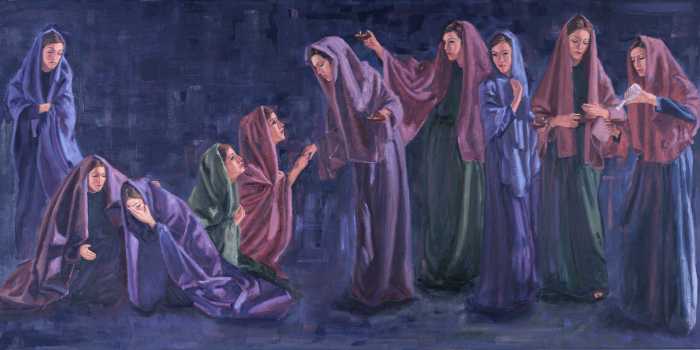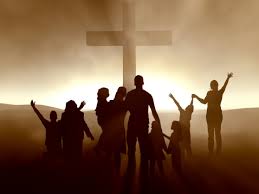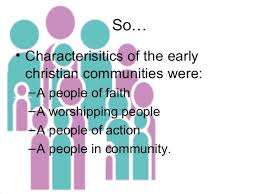
-12-11-23-

Gospel text
vs.1 Jesus told this parable to his disciples:
“The kingdom of heaven will be like this:
Ten bridesmaids took their lamps and went to meet the bridegroom.
vs.2 Five of them were foolish and five were sensible;
vs.3 the foolish ones did take their lamps, but they brought no oil,
vs.4 whereas the sensible ones took flasks of oil as well as their lamps.
vs.5 The bridegroom was late, and they all grew drowsy and fell asleep.
vs.6But at midnight there was a cry,
‘The bridegroom is here! Go out and meet him.’
vs.7At this, all those bridesmaids woke up and trimmed their lamps,
vs.8 and the foolish ones said to the sensible ones,
‘Give us some of your oil: our lamps are going out.’
vs.9 But they replied, ‘There may not be enough for us and for you; you had better go to those who sell it and buy some for yourselves.’
vs.10They had gone off to buy it when the bridegroom arrived. Those who were ready went in with him to the wedding hall and the door was closed.
vs.11 The other bridesmaids arrived later. ‘Lord, Lord,’ they said ‘open the door for us.’
vs.12 But he replied, ‘I tell you solemnly, I do not know you.’
vs.13 So stay awake, because you do not know either the day or the hour.”
*******************************************************************
We have three commentators available from whom you may wish to choose . Scroll down to the required author.
Michel DeVerteuil: Lectio Divina with the Sunday Gospels – Year A
Thomas O’Loughlin: Liturgical Resources for the year of Matthew
Donal Neary S.J. Editor of the Messenger
****************************************
Michel DeVerteuil
Lectio Divina with the Sunday Gospels
www.columba.ie
General Comments
Today’s passage is a teaching on “what the kingdom of heaven will be like” (verse 1). This biblical expression means the coming of grace into the world. The passage therefore is a teaching on grace, inviting us to recognise and celebrate our experiences of grace, and to prepare ourselves for future comings.
“Will be” is a reminder that the final and definitive coming of grace lies in the future, but the teaching also refers to the many partial but real comings of grace that we and our communities (including the worldwide human family) have experienced.

The teaching is parabolic so it is important to remind ourselves of how we meditate on a parable:
*The parable comprises different characters; we choose the one(s) we want to identify with and read the parable from his or her (their) perspective.
* A “crunch point” occurs at a certain stage of the story, a turning point which jolts us so that we know instinctively that this is the central moment in the parable. The “crunch point” will be different for different people; indeed it will be different for us at different stages in our lives.
In this parable there are four possible “crunch points”:
1. -The moment of the cry, “the bridegroom is here” (verse 6) – grace always takes us by surprise.
2. -The foolish bridesmaids find out that their lamps are going out and the wise ones will not give them oil
(verses 7 to 9) – grace is always “disturbing“.
3. -The wise bridesmaids go with the bridegroom into the wedding hall (verse 10) – grace is pure joy.
4. -The foolish bridesmaids come late and are told “I don’t know you” (vs 11 and 12) – grace brings feelings of remorse, despair even, but as a step to conversion.
In each case the bridesmaids represent two possibilities and we have been both at different times of our lives. The “wise” (a better word than the Jerusalem Bible’s “sensible“) are ourselves at our best, the “foolish” ourselves at our worst.
We can also focus on the bridegroom, remembering times when someone waited a long time for us to come to the best of ourselves (I took this approach in one of the prayers below).
Focusing on the person of Jesus can help bring the passage alive for us. At this point in his life, he is in Jerusalem, about to be arrested and crucified. The parable then becomes a testimony to his own attitude – he is a wise bridesmaid,- ready for his moment of grace. It is also a heartfelt warning to his beloved disciples that they must not be like the foolish bridesmaids and miss their moment of grace when he is arrested. Who does he remind us of?
Textual comments
Verse 6: We can focus on either of two aspects of the moment of grace:
* It does not happen instantly, we have to wait a long time for it, so long that we “grow drowsy (get a feel for that) and fall asleep”.
* When it comes, it is a surprise, like being wakened from sleep by a peremptory cry (“a rude awakening”).
Verses 7 to 9: Grace always disturbs. It makes us fumble, look for solutions that are both impractical and unreasonable – like expecting the wise bridesmaids to give of their oil supply even though they risk not having enough, neither for themselves nor for others.
We must make the effort to identity what Jesus meant by the “extra flask” of oil. It is what makes the difference between “good” and “great“, “courageous” and “heroic“, “run-of-the-mill” and “special“.
Verse 10: The moment of grace is like entering into a great festive hall, accompanied by one we have waited long for. We think of:
– our marriage ceremony (or 25th or 50th anniversary);
– the first sexual experience;
– the return home of an addict;
– a moment of national reconciliation.
Verses 11 and 12: These verses are almost unbearably sad. We enter into the feelings of the rejected bridesmaids, the finality of the door being closed while the bridesmaids shout, “open up,” the hopelessness of hearing the words “I don’t know you”. We can imagine the remorse – “why wasn’t I ready when he came?”
We think of similar experiences:
– parents wanting their children to open up to them after years of neglecting them;
– abusers faced with the break up of their families;
– national leaders trying in vain to get warring parties to be reconciled.
The teaching reminds us that we must live with the consequences of our choices.
There is nothing airy fairy about Jesus – or about teachers like him.
Though this particular relationship can never be recovered, there will be other chances of healthy relationships – so the teaching is positive and a call to repentance.
The concluding verse 13 stands on its own. It is not strictly a comment on the parable since none of the bridesmaids actually “stay awake“. The verse is rather a general teaching on “staying awake” to the grace of the present moment – “the day and the hour”.
The deepest truth of every “day and hour” is that the bridegroom has arrived.
We give the word “know” its full meaning of “perceiving all the possibilities latent in…”.
Scriptural Prayer Reflection
Lord, you really like to keep us waiting:
– for long years we struggled with an alcohol problem;
– we thought that a difficult child would never settle down;
– the parish youth group kept going from one crisis to the next.
Then, all of a sudden, out of the blue, the moment of grace came. It was as if at midnight, when everybody had gone to sleep, there was a cry, “The bridegroom is here! Go out to meet him!”
We thank you that we did not give up hope;
somehow or other we had left ourselves open to the possibility of better things:
we had kept an extra flask of oil alongside our regular supply,
so that we were able to trim our lamps and welcome the bridegroom when he came.
Thank you, Lord.
“My mother don’t have time to talk to me. I don’t have her to tell me things. When she comes home from work, she only has time to clean the kitchen, sleep and back to work again.” …J.B. A young man in T&T, WI
Lord, we pray for parents. It is not easy for them. They are frequently so tired at the end of the day that when the children come to share their lives with them they have grown drowsy and fallen asleep.
Give them that reserve of energy so that they may never have to come knocking at the door of their children’s hearts and hear the terrible words, “I do not know you.”
Lord, we thank you for the experience of the sacrament of reconciliation
celebrated after many years being away. It was like arriving late at night, long after we were due, and yet being welcomed with great joy like a bridegroom being escorted into the wedding hall.
Lord, nowadays we are accustomed to doing things instantly,
turning a switch or putting in a plug.
So we tend to think that we can know people instantly too.
But having someone open up to us always takes a long time.
It is like being a bridesmaid and having to wait late into the night
for the bridegroom to come, and then continue to wait,
and when we have almost given up hope that he will come,
to hear that he is there and we must go out to meet him.
It is only after that kind of waiting that two persons can enter into deep intimacy.
“I promise by thy grace that I will embrace whatever I last feel certain is the truth, – if I ever come to be certain.“ …Cardinal Newman as he wondered whether he should join the Catholic Church
Lord, we pray for those who are searching:
– those who, like Cardinal Newman, ask themselves if they should leave their Church and join another;
– young people not sure what their vocation in life is;
– friends who cannot decide on marriage.
Give them the grace to continue waiting, not pretending that the bridegroom has come if he hasn’t, confident that when at midnight there is the cry, “He is here!” they will go out to meet him.
Lord, we spend a lot of energy fighting against the present moment
– blaming ourselves or others for mistakes of the past;
– regretting that things are not as good as they could be;
– anxious about how the future will be.
And so our eyes are closed to the possibilities that are there in the present.
Teach us always to stay awake, because we do not know the day or the hour of your grace.
“Care for the dying is founded upon two unshakeable beliefs: that each minute of life should be lived to the full, and that death is quite simply part of life, to be faced openly and with hands outstretched.”
….Sheila Cassidy
 Lord, we thank you that you call some of us to minister to the dying.
Lord, we thank you that you call some of us to minister to the dying.
Some are afraid, others angry or confused. You want us to help them all to welcome you;
to teach people, as Jesus did, that it is all right if we fall asleep when you are long in coming, because we know that when the cry goes up, “The bridegroom is here!” we will merely trim our lamps and go into the wedding hall with him.
********************************************************
Thomas O’Loughlin
Liturgical Resources for the Year of Matthew
www.columba.ie
Introduction to the Celebration
 Sisters and brothers, each week when we assemble for the Eucharist we enter into the presence of the Father, and offer him the sacrifice of praise in union with Christ Jesus. We enter into the presence of Christ, and through him into the presence of the Father. Today we reflect that as the people of the Lord Jesus we are called to be always awake and ready to bring his wisdom to our world and to be his presence among all the people we encounter.
Sisters and brothers, each week when we assemble for the Eucharist we enter into the presence of the Father, and offer him the sacrifice of praise in union with Christ Jesus. We enter into the presence of Christ, and through him into the presence of the Father. Today we reflect that as the people of the Lord Jesus we are called to be always awake and ready to bring his wisdom to our world and to be his presence among all the people we encounter.
Homily Notes
1. How do we learn to be Christians? This question assumes that we already have a clear sense of who we are when we gather here.
2. Let’s think of some groups that we are all familiar with. The first is a group of people on a plane: they all want to go to the same place at the same time, so they have something distinctive in common; but would you call them a community? They are really a collection of individuals who just happen to have something in common, and it is easier to get a service if the costs are distributed. Imagine someone offered that group a free lottery: ten lucky people could win a chance to travel in a private jet to the same destination at the same time: there would be them (either on her /his own, or if they are travelling as a couple or a family, then just the couple or family on the private jet). How many would want his/her name in the draw? I suspect, virtually everyone. The group travelling together is only a collection with little that matters in common.
Now imagine a long-distance train or bus journey: the train/bus goes along a fixed route each day from A to Z, and there are a few who are on it for the whole journey. Others get on at C and off at K, while others get on at K and go on to X; still more get on somewhere else and get off at yet another stop. It is a friendly train, the conductor reminds people that they are approaching a station and warns them to be ready to get off, if that is their stop and reminds them to check that each has all personal belongings with them. Sometimes those who take a train often, recognise other travellers by sight, sometimes they might even speak, sometimes not a word is uttered. And, while they all go along the same journey together, each has individual interests: some are reading, some chatting to friends, others listening to music on headphones, others texting on their mobiles, and here and there you can see people with a look of deep concentration: they are doing Sudoku.
3. Now shift your imagination to a birthday party. Again, lots of people in the same place at the same time with a common interest. But the dynamics are completely different: they all have a sensed of being there because of something that unites them. There would be no sense in asking if they wanted to eat separately or go off on their own: their whole purpose is to be together. This is what celebration means. People are doing different things, but it is the whole group that makes the party.
 4. Now consider this: is gathering today for this Eucharist just people together in the sense of the plane (all want the same thing and cannot get ‘it’ individually) or the bus (people just joining in for the bits they need) or is it a celebration: all invited to be the party at the banquet?
4. Now consider this: is gathering today for this Eucharist just people together in the sense of the plane (all want the same thing and cannot get ‘it’ individually) or the bus (people just joining in for the bits they need) or is it a celebration: all invited to be the party at the banquet?
5. Jesus came to form a community. We say that we are called to his supper, and he wants the way we behave here at his table to be a model for how we treat one another and all people.
6. But is this our attitude? We offer a sign of peace, but are we ready to make common cause with those around us? Do we seek to get to know them? This is the great open meal, so if someone has just joined us today, would they feel welcome?
7. We have to learn to be Christians by learning to live and work together; but Jesus realised that a primary first step was to learn how to share with one another at this meal. Here we learn how to be Christians; here we learn how we must communicate the welcoming love of the Father; here we are acclimatised as a group for the banquet prepared for us in heaven.
****************************************************************
Donal Neary SJ
Gospel Reflections For Sundays Year A
www.messenger.ie
Jesus always new
 The lamp is the light of love and hope, and at its centre is the light of Christ. The light is given to us in many ways in our lives – it shines within as an eternal joy, and outwards to many others. Jesus often advises, ‘keep your lamps burning’ and ‘Let you lights shine.
The lamp is the light of love and hope, and at its centre is the light of Christ. The light is given to us in many ways in our lives – it shines within as an eternal joy, and outwards to many others. Jesus often advises, ‘keep your lamps burning’ and ‘Let you lights shine.
Like when the bulb goes out when the electricity fails, the lamp can go out without oil. The people of the gospel felt foolish that they had not brought oil with them to light their way. The oil is prayer an our relationship with Jesus. This is the essence of the Christian life. Our Christian life is following a real, loving person: it is an invitation to get to know Jesus, and to find ourselves drawn from our hearts to follow him. Without this living relationship with Christ, words sound empty. We sometimes hear someone speaking of their Christian faith and cannot help wondering if it comes from the inside or is just a list of things to be believed and read.
Ignatius of Loyola’s famous prayer is the prayer of the follower of Jesus; ‘Lord, teach me to know you more, love you more and serve you more faithfully in my life.’ (Spiritual Exercises). The more indicates that this is never a finished product: like love and friendship it grows in our lives. It is exciting that Jesus is never gone from us.: risen from the dead he is always alive, always new. Our reading of the gospel, our sharing at Mass and the sacraments and our personal prayer keep this relationship always alive, always new.
Thinking of a bright lamp, or imagining one,
ask for an ever-brightening light of Christ in your life.
Lord, teach me to know, love and serve you more faithfully every day
***************************************